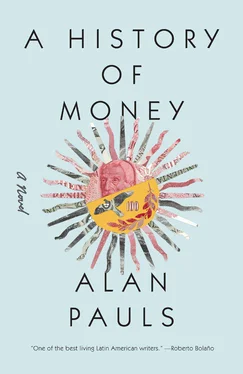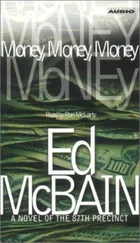In a fraction of a second, everything shifts backward and speeds up. He goes to his mother, takes back his case with a yank while giving her a quick kiss, runs to his father and takes his hand (the hug is saved for later, for when his father is really his father again), and they step down into the street together. Walking backward, in the same direction as the advancing cars but facing them, as though he’s not prepared to lose a second more, his father stretches out an arm, stops the first taxi (which brakes with customary precision, delivering the back door’s handle directly to him), pushes his son into the backseat, and, after piling up their luggage on the front seat, sits beside him. Then, agitated and rapidly rolling down his window, he gives the order, “To Villa Gesell.”
In 1966, in Argentina, the only people who would take a taxi on a 103-kilometer journey between resorts on a potholed road with no shoulder and no service stations, which is fed by tributary streams of bicycles, cars without lights, trucks with ravaged steering columns, and other mortal threats, are taxi drivers on vacation, people running away from the police, and compulsive gamblers drunk on the euphoria of an unexpectedly prosperous night at the casino. His father, who as far as he knows is none of these things, for the moment at least, though that might change, dives headfirst into that Rambler while it stands boiling in the sun of the most perfect day of the summer; he doesn’t ask any questions, not even whether the journey he’s just requested is actually possible, whether the taxi driver will accept it or not, or, most important, whether he has enough money to cover it. He takes all that as given, as though it had already happened. In fact, nobody devotes a single word to the matter during the entire journey. Certainly not his father, who now, after a whole month away from his son, wants to make up for lost time and find out about everything he’s done in his absence. Nor him, not a word. The prodigious recklessness that had captivated him a moment earlier now frightens him. He thinks that if he says anything, if he mentions what has just happened, even if only to confirm that it really happened and relive the elation he felt while it was happening, what happened might stop happening, history might retreat and everything disappear and return to nothing. And while all this goes on and he hears himself recounting the minutiae of his summer, pausing on the dead man, on his boundless passion for those crostini and above all on the repulsive noise he makes while he chews them — a detail that his father celebrates with a loud burst of laughter that’s inspired by vanity more than real appreciation or entertainment, so proud is he that his son, at six years old and in the heart of his stepfamily, has used the gift for microscopic observation he says has always characterized the men of the family, even though an important part of that lineage, his own father, used that gift, in which he seems to have excelled, to make his son’s life a true nightmare — his attention keeps wandering off entirely, attracted by the ticking of the taxi’s meter, on which the slides have started to fall, they’re falling, they will continue to fall, he thinks, for a long time, for the whole unheard-of eternity known as 103 kilometers, and they won’t stop until they’ve reached who knows what number.
He doesn’t have the faintest idea. Now, with the dead man’s face so near and another expansive wave of crostini-crackling assailing him, he can’t help but ask himself how much money there was in the attaché case of which there’s no news even when the police divers find the helicopter and the bodies at the bottom of the river, how much and, crucially, why the dead man was asked to take that money to the plant at Zárate in person, whether it’s to pay the supplementary under-the-table fee the police want to charge for carrying out the suppression agreed on by the management and the local heads of the force, or to placate the workers with a pay raise that will distract them from the radical demands they’re being pushed toward by the red faction of the union leadership, which plays an all-or-nothing game, or even to bribe the red faction of the leadership directly and resolve the whole matter without a bloodbath. But what he’d really like right now is to be able to remember how much the taxi ride to Villa Gesell cost. No hope: it’s a total blank. What he does know is that it’s the first large sum of money he’s aware of, or the first time he’s aware that money can be a large sum. Until then it was always small, portable, just another thing among many, only touched by a sort of ancient magic wand — so ancient that the few people who have seen it in action are dead — that gives it its ability to overpower everything else, to eat it up ; the exact power he discovers his pieces wield over enemy pieces and vice versa a little later in front of a chessboard in the dining room of the Croatian hotel he dreams of while traveling by taxi to Villa Gesell. By taxi, to Villa Gesell, while outside the world keeps stupidly turning, indifferent to this feat.
But what relation can there be between the kind of money capable of eating up a bar of milk chocolate, a packet of baseball cards, an eraser, or the bus ticket to Villa Gesell that’s now going through its death throes at the bottom of his pants’ pocket, and the money you’d need to get together in order to eat up something invisible, something as out of scale as those 103 kilometers to Villa Gesell? He’s seen money, of course. At the age of six he has even lent it. He has what he calls my safe, an old first-aid box with a cracked red cross and a loose lid, in which he keeps his capital, coins, small or torn notes, change that his mother and his mother’s husband and even his father sometimes let him keep. It’s to him and his safe — which infuses his money with the smell of bandages, adhesive tape, and Merthiolate while it sleeps — that his mother turns when she needs change for a tip or some small expense, which happens more often than she would like but still always takes her by surprise and fills her with a dramatic sense of adversity, setting her hurriedly rummaging in her purse while the doorman, the newsstand guy, or the grocery store’s delivery boy stand waiting, until she comes up with nothing, not a single coin. His safe: how he treasures those casual donations when he gets them, and how little he seems to remember receiving them later on, when, the fourth or fifth time his mother asks him for a loan — she’s always short of change, though it’s impossible not to be in a city and a country where small sums of money are and always will be precious commodities — he delights in reminding her of all those she has yet to repay — every single one to date — and warns her to settle her account.
How much. He starts wondering even while he sits in the backseat of the taxi, curled up against his father, who has rolled his window all the way down and is sticking out a defiant arm that’s perfectly browned before his vacation has even begun. He looks at the meter hanging on the taxi’s console and allows himself to be entranced by the mechanical regularity with which those ancient numbers, already ancient even then, replace one another in the machine’s two little windows, like candidates voluntarily renouncing a starring role — that of the definitive figure for the journey — even though nobody has taken the trouble to judge or reject them. If only he knew, he could lose himself in what will later be one of his favorite pastimes (which he puts to use every time he has to pay for any countable goods): prorating. He could prorate the total cost of the journey according to the minutes taken, and know the price of not only the 103 kilometers to Villa Gesell, but also each kilometer, or the time the Rambler takes to cover each kilometer. But he doesn’t know. He won’t know until an hour and forty-five minutes later, when they arrive in Villa Gesell and the taxi parks outside the hotel run by Croatians, and his father, with the remarkable dexterity picked up who knows where that gives his gestures a prodigious insouciance, as if he were performing them in a medium with no possible obstacles — air or water — puts a hand in his pocket and pulls out the wad of notes to pay.
Читать дальше












